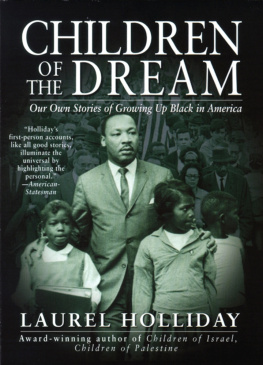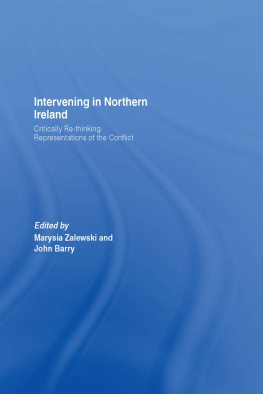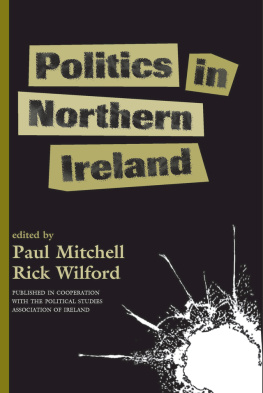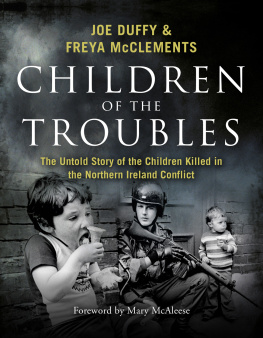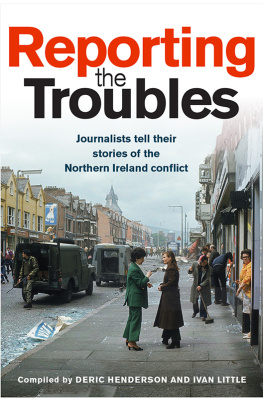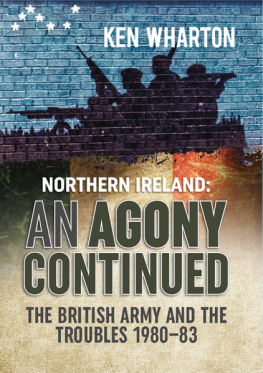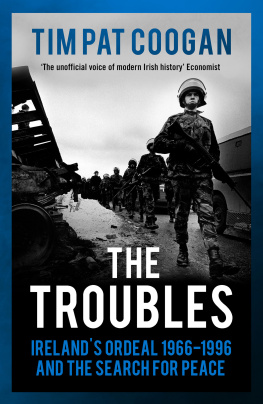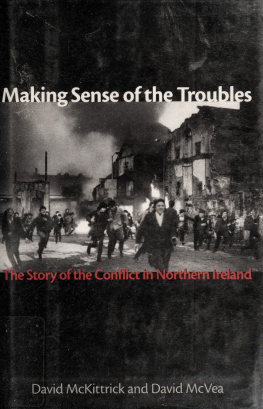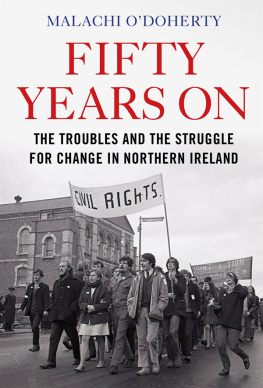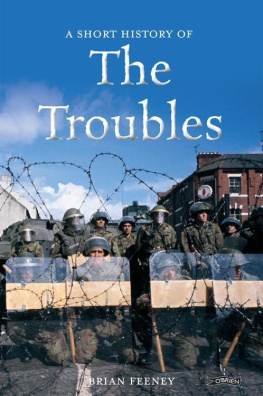A Peoples Movement
The Fight for Reform in Northern Ireland
Ryan Conner
new degree press
copyright 2021 Ryan Conner
All rightsreserved.
A Peoples Movement
The Fight for Reform in Northern Ireland
ISBN
978-1-63676-329-3 Paperback
978-1-63676-305-7 Kindle Ebook
978-1-63676-341-5 Digital Ebook
Contents
part One
1916 and Disputes over the History of British Rule in Ireland
Chapter 1
Dublin, April 1916 : Irish Nationalism and the Easter Rising
Chapter 2
Belfast and France, July 1916 : Ulster Unionism and the Battle of the Somme
Part Two
The Collision of Past and Present in Derry, Northern Ireland, 19201972
Chapter 3
Northern Nationalism, Unionism, and Commemoration after Partition
Chapter 4
Housing Protests and the Stirrings of Reform
Chapter 5
Republicans, Socialists, and Civil Rights : Strategies of Reform or Revolt?
Chapter 6
Student Activism, the New Left, and the Unionist Retreat
Chapter 7
Free Derry and the Forces of Law and Order
Chapter 8
Bloody Sunday : The Demise of Civil Rights?
Conclusion
The Peace Process and the Meanings of Civil Rights
Preface
My friend and I landed in the Dublin airport in May 2019. As we approached the customs window, I anticipated that the exchange would not be all that different from any other time I had gone through customs. We handed our passports to the officer. He examined them and asked us about the purpose of our trip. Both were standard protocols so far. My friend said we were visiting Ireland for eight days to learn about some of its history. The officer responded, to paraphrase, With names like yours, are you sure youre not coming home?
I did not yet know last May that I would have the opportunity to write a book. Hardly did I know that I would decide to write about Northern Ireland. However, I often have told the story of my warm welcome to Ireland to anyone who would listen, so it stayed with me as I thought about many different ideas for this project. My family and I had always talked about traveling to Ireland when my brother and I became adults. I often heard stories tracing our extended family back to the country. However, some of my brothers genealogical research had revealed that much of the family did indeed emigrate from Ireland in the nineteenth century, but many also from Scotland, England, and the European Continent as early as the seventeenth century and as late as the twentieth. Nevertheless, the family still regards itself as very Irish-American.
These themes loomed large as I sat down at the kitchen table with my mom early in the process to discuss ideas for the book. That same day, I stumbled across a Congressional Research Service report on Northern Ireland. The report touched on many themes that had interested me as an undergraduate, but it also revealed that writing about Northern Ireland could push me in new research directions, such as the study of borders, peacebuilding, and transitional justice. Much of my secondary and post-secondary education only briefly referred to the history of Ireland and Northern Ireland. Several themes in my post-secondary education, however, informed this books approach. Nearly all of my history coursework and independent research involved conflict and memory. One of my research seminars placed the experiences of civilians squarely at the study of the US Civil War, especially those, such as women, who had been traditionally neglected in political histories. Some classes in international history attuned me to the nuances of British colonialism and post-colonial nationalism in the Middle East and South Asia. All of these experiences informed my research, writing, and thinking.
I shared my early ideas about Northern Ireland with a friend, and she told me about the one time she saw the famous wall murals in Belfast. Her enthusiasm for the project inspired me to commit to spending the year learning and writing about Northern Ireland. My familys stories about its ancestry, in retrospect, have shown me the power of ideas and stories over our understanding of the past and ourselves in the present. I used these insights to help make sense of historical memory in Northern Ireland. I do not aim to debunk historical myths and memories. Instead, I study how such memories inform action, following the convention of many scholars of memory studies in the past few decades. I hope this insight will resonate among the readers.
Kristin Archick, Northern Ireland Peace Process: Current Issues and Ongoing Challenges, version 47 (Washington, D.C.: Congressional Research Service, 2019), last accessed January 7, 2021.
See, for example, Richard S. Grayson and Fearghal McGarry, eds., Remembering 1916: The Easter Rising, the Somme and the Politics of Memory in Ireland (Cambridge, UK: Cambridge University Press, 2016), 8.
MAP

This US-produced map shows the city of Londonderry, after the British place name. Irish nationalists would refer to the city as Derry. It has become a standard convention in academic texts to refer to the city as Derry.
Credit: reproduced from an original in the collections of the Geography & Map Division, Library of Congress.
Abbreviations
Bloody Sunday Justice Campaign (BSJC)
British Broadcasting Corporation (BBC)
Bogside Citizens Association (BCA)
Bureau of Military History Witness Statements (BMH WS)
Campaign for Social Justice in Northern Ireland (CSJ)
Conflict Archive on the INternet (CAIN)
Democratic Unionist Party (DUP)
Derry Citizens Action Committee (DCAC)
Derry Citizens Defence Association (DCDA)
Derry Housing Action Committee (DHAC)
European Union (EU)
Gaelic Athletic Association (GAA)
Good Friday Agreement (GFA)
Homeless Citizens League (HCL)
Irish Anti-Partition League (IAPL)
Irish Citizen Army (ICA)
Irish Parliamentary Party (IPP)
Irish Republican Army (IRA)
Irish Republican Brotherhood (IRB)
Member of Parliament (MP)
Northern Ireland Civil Rights Association (NICRA)
Northern Ireland Housing Trust (NIHT)
Northern Ireland Housing Executive (NIHE)
Official Irish Republican Army (OIRA)
Peoples Democracy (PD)
Provisional Irish Republican Army (PIRA)
Public Record Office of Northern Ireland (PRONI)
Raidi Teilifs ireann (RT)
Royal Ulster Constabulary (RUC)
Sinn Fin (SF)
Social Democratic and Labour Party (SDLP)
Student Nonviolent Coordinating Committee (SNCC)
United Kingdom (UK)
Ulster Volunteer Force (UVF)
Introduction
A native of the Bogside neighborhood of Derry, Nell McCafferty has been a journalist, author, and activist. She delivered an interview in March 1996 for an oral history initiative that collected the experiences of Catholics and Protestants in Derry between the late 1960s and mid-1990s. Having reviewed her own experiences, McCafferty flatly stated, I wish you had asked me how I felt as a woman through all of this.


